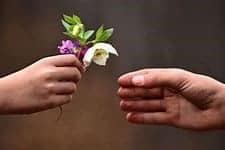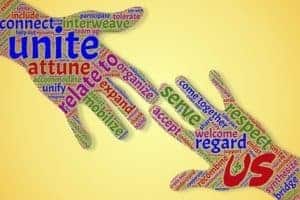(On this day, Maggie is pondering…) Today is Good Friday for those of you who practice the Christian religion. I do remember going to church years ago and, towards the end of the service, we were instructed to give the sign of peace which was a gentle handshake and a smile with others near you. I also remember learning as a child to say “God Bless You” to anyone who sneezed. I was taught as a child that it was good manners and I have always been curious about the origin of this ritual and that of shaking hands.
As we look to science for answers, it might be interesting to note that a sneeze can fly at 100 miles per hour and travel via wet spray for 5 feet. In times past, we recall that sneezing was linked to some dreaded disease and its main symptom was sneezing. Our research found that the blessing ritual was more than likely started during the Christian Roman Empire around 590. Pope Gregory I at the time believed that a sneeze was an early symptom of the bubonic plague that was ravaging Europe. Consequently, he commanded all Christians to respond to a sneeze with a blessing in hopes of protecting that person from death. In ancient times, people also believed that sneezing allowed the evil spirits to enter our body so saying “God Bless You” presumably kept out those evil spirits. In other cultures, the German response to a sneeze is traditionally “Gesundheit” which means good health, the Spanish response is “Salud” and the Italian response is “Salute”, both meaning health. All are a sign of divine beneficence and kindness.
Some people today aren’t quite sure why they say “God Bless You’” to a sneeze other than they have been conditioned in their younger years to do so. Some have modified their response to “Bless You,” removing the God portion. For many, it has become a reflex of sorts and, on some level, it fills a need to connect to people in this manner. In the past, we have asked what purpose does this gesture serve in modern times?
That information also leads us to question the origin of shaking hands. This greeting apparently dates back to Ancient Greece. The thinking was that, by shaking hands rather than bowing or curtseying, both parties proved they were equal and they felt comfortable with each other. It was interpreted as neither party was carrying a weapon. It was also seen as a gesture of friendship. For a couple, it was a sign of affection and commitment. So, we ask, is this what led to hand washing? In the Middle Ages, people frequently washed their hands because they were well aware of the link between dirt and illness.
So fast forward to 2020 and we are in the center of a pandemic. Many things are changing like the notion of a handshake and our reaction to the sound of a sneeze. This week, while taking a walk in our neighborhood, we heard a person sneeze loudly. The first thought was how far away is that person and did he sneeze away from us? We instantly became concerned about our own health and not thinking to bless anyone but ourselves. We are not unkind people but we felt the need to protect ourselves. This is now our first instinct and has quickly become our new reflex. Is a sneeze again the symptom of a dreaded disease? Can you remember the last time you shook hands with someone? Can you remember laughing at your first elbow bump or your last? We have been taught that we must take care of ourselves so that we will be there to help others and not become a burden to the system. So, we protect ourselves when someone sneezes and cannot imagine a hand shake in our future. How quickly our customs and rituals have changed right before our very eyes.
This new form of distancing is one of the many phenomena that is rapidly changing in our current culture as we move through this pandemic. Some of the changes are more obvious than others. We rather envy those who live on a farm right now and can fend for themselves. In many ways during this pandemic, we are being asked to return to living like the Walton’s on Walton’s Mountain, VA in the late 1800’s. The Walton’s tv show embodied a life of fewer services, intense family time, self-sustaining behaviors, conservation of resources, and going to bed at dark and waking when the sunlight arrived. Let’s hope that we have not become so spoiled that we cannot adapt for at least some time to these principles. Yes, as our norms and ideals change, it may be a good time to exert our flexibility and adaptability. For, if we don’t, we have no choice other than to complain and wither.
How we come out on the other side of this isolation and cultural shift is mostly under our control. It is our hope that we come out kinder, more connected, and that the girth that we gain will not be at our waistline but rather in our thinking.
As always, Be Kind
and “Goodnight John Boy.”



